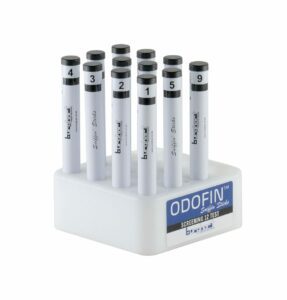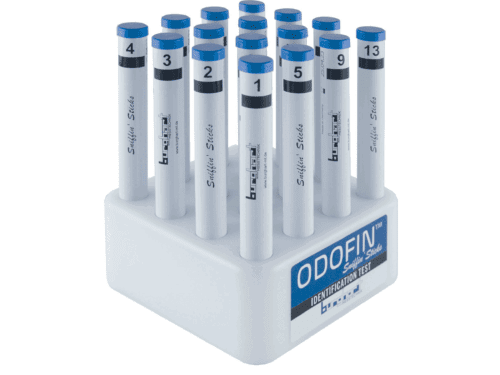
People with a smell disorder (olfactory disorder) have either a decreased sense of smell, no sense of smell, or changes in the way they perceive smells. The different olfactory disorders are:
- Anosmia: The total loss of the sense of smell. A distinction can be made between selective and complete anosmia. As the name suggests, selective anosmia is the inability to smell certain odors. In complete anosmia, the person will no longer be able to perceive any smell.
- Hyposmia: a decreased sense of smell. This is a quantitative olfactory disorder and comes in varying degrees: mild, moderate and severe. This form of sense of smell loss is common with aging and is not reversible.
- Parosmia: this is a qualitative olfactory disorder in which odors are still perceived but in which the odors are registered in a different way than usual. When registering the odors in parosmia, a distinction can be made between: Euosmia: Smells are perceived as pleasant smells and Troposmia: odors are perceived as foul or unpleasant odors
- Hyperosmia: This occurs when a person perceives odors excessively. The odors are correctly perceived but at a higher intensity.
- Agnosmia: smells are perceived but the person is unable to name these smells.
- Fantosmia: a smell is perceived that is not actually present. This is a so-called smell hallucination. When these are unpleasant odors, this disorder is called kacosmia.
Qualitative and quantitative loss of smell
If we look at the literature, we can divide the causes of an olfactory disorder into qualitative and quantitative loss of smell:
- Qualitative olfactory disorder, this is an olfactory disorder in which odors are experienced in a different way. For example, odors become more intense, distorted or experienced as unpleasant. Consider cacosmia, parosmia, phantosmia, agnosmia and hyperosmia.
- Quantitative olfactory disorder: a measurable reduction in the sense of smell, such as anosmia and hyposmia. This can be divided into:
- Conductive loss of smell: this occurs when there is an abnormality or blockage in the nose that simply prevents the smell from reaching the olfactory nerve. Consider a blocked nose due to irritation of the nasal mucosa or a crooked nasal septum.
- Perceptual loss of smell: the odors are present but the olfactory system does not work properly. Olfactory stimuli are not properly conducted from the nose to the brain due to damaged olfactory nerves, or are not processed properly in the brain.
 What causes reduced sense of smell and taste?
What causes reduced sense of smell and taste?
Smell disorders have many causes, some more obvious than others. In many cases, people who develop an olfactory disorder have recently had an illness or injury. The most common cause is a viral infection of the upper respiratory tract. Upper respiratory infections are often caused by viruses such as cold and flu viruses. Below is a selection of possible causes:
- Aging
- Upper Respiratory Infection
- Smoking
- Growths in the nasal cavities
- Head injury
- Hormonal Disorders
- Dental problems
- Exposure to certain chemicals, such as insecticides and solvents
- Numerous medications, including some common antibiotics and antihistamines
- Radiation for the treatment of head and neck cancer
- Conditions that affect the nervous system, such as Parkinson’s disease or Alzheimer’s disease.
- Some people are born without the sense of smell, this is called congenital anosmia.
How are smell disorders diagnosed and treated?
Both smell and taste disorders are treated by an otolaryngologist, a physician who specializes in diseases of the ear, nose, throat, head, and neck. An accurate assessment of an olfactory disorder includes a physical exam of the ears, nose, and throat; a review of your health history and an smell test.

If a person cannot smell or properly identify the scent, it could indicate an olfactory disorder or impaired sense of smell.
Diagnosis by a doctor is important to identify and treat the underlying cause of a potential odor disorder. If your problem is caused by medications, talk to your doctor to see if lowering the dosage or changing the medicine can reduce the effect on your sense of smell. If nasal obstructions such as polyps restrict airflow into your nose, you may need surgery to remove them and restore your sense of smell.
Some people recover their ability to smell when they recover from the illness that caused their loss of smell. Some people spontaneously recover their sense of smell for no apparent reason. If your smell disorder cannot be successfully treated, you may want to seek help to help you adjust. In some cases it may also be advisable to start with smell training. The effect of smell training has been investigated in various clinical studies and shows that it is especially effective in people who suffer from an olfactory disorder as a result of an infection of the upper respiratory tract, such as is the case with a corona infection, cold or flu. In addition, research also indicates that smell training has a positive effect on restoring the sense of smell in traumatic brain injury.
Are olfactory disorders serious?
Like all senses, your sense of smell plays an important role in your life. Your sense of smell often serves as a first warning sign, alerting you to the smoke from a fire, spoiled food, or the smell of a natural gas leak or dangerous fumes.
When the sense of smell is affected, some people change their eating habits. Some may eat too little and lose weight, while others may overeat and gain weight. If food becomes less tasty, you can use too much salt to improve the taste. This can be a problem if you have certain medical conditions or are at risk for certain medical conditions, such as high blood pressure or kidney disease. In severe cases, loss of smell can lead to depression.
Problems with your chemical senses can be a sign of other serious health problems. A smell disorder can be an early sign of Parkinson’s disease, Alzheimer’s disease, or multiple sclerosis. It may also be related to other medical conditions, such as obesity, diabetes, hypertension and malnutrition. Do you (suspect) have an olfactory disorder? Please contact your doctor for professional advice and examination.

 What causes reduced sense of smell and taste?
What causes reduced sense of smell and taste?




